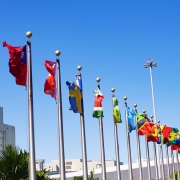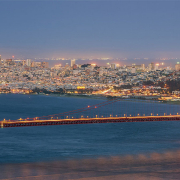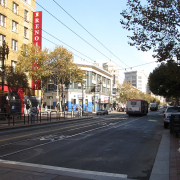Why London is Beating American Cities
As America’s cities continue to decline, as even ardent boosters warn of “an urban doom loop”, how does London remain a global powerhouse? The straightforward answer is that it retains an old advantage: its origins as a former imperial capital.
Unlike the high-rise “transactional” cities of New York, Chicago and San Francisco, all groaning under record levels of vacancy and massive investor losses, London never had an official “downtown”, with all major business clustered in dense formations. Rather, as one observer noted in 1843, London’s development occurred organically, surrounding “itself suburb by suburb like onions 50 to rope”. Of course, parts of central London have suffered significant losses — see Canary Wharf and Spitalfields — but the capital’s archipelago of villages have mostly survived. Far more than its great American rivals, London is actually increasing its population.
This, let’s not forget, comes in the wake of Brexit, which many feared would turn the City into a tertiary player. Yet even here, despite the loss of listings from some prominent firms such as ARM, London is thriving: it has since welcomed the financial powerhouses of Bloomberg, Citadel and Alantra into its embrace.
Crucial to London’s success is its prospering technology and media industries, which, notes Tony Travers, a visiting professor at LSE, increasingly drive the capital’s economy. Its creative sector, for instance, now accounts for almost 15% of jobs in London, up from 11% in 2010. In the realm of tech, one recent study suggested that London beats New York and San Francisco. Indeed, Microsoft plans to open an AI hub in the city, part of a $2.5-billion investment strategy, following other firms such as OpenAI. According to the Harvard Business Review, this makes London both first in the world for talent attraction and the top destination for foreign investment in financial and professional services.
None of this is to say that London’s streets are paved with gold. Flick through the capital’s Evening Standard and you’ll find report after report about surges in crime. Even so, notes Munira Mirza, who served as policy director for former prime minister and London mayor Boris Johnson: “London is doing better in many ways than a lot of US cities… But for Londoners, the perception is that crime, street cleanliness, housing costs, road congestion, etc, have been getting worse because public services and infrastructure have not expanded to match the growing population.”
“London is doing better in many ways than a lot of US cities.”
And yet, she observes, overall crime rates have fallen under London’s last three mayors and, in terms of crime and anti-social behaviour, levels are well below the national average. Travers partly credits this to the fact that the UK has not experienced an American-style “opioid crisis” or “defund-the-police moment”. As a result, London saw 104 homicides last year, equivalent to 12 per million people, compared to 45.4 per million in New York, one of America’s safer cities.
A similar story is playing out in London’s classrooms, particularly when it comes to ethnic-minority performance. In one diverse district in Chicago, not one student can do grade-level math. According to data from the Illinois State Board of Education, 30 schools last year, 22 of which are in the Chicago area, failed to lift even one student to grade-level reading.
In London, by contrast, state schools are consistently improving, particularly in recently developed free schools. Moreover, immigrants are actually lifting the performance of London’s state schools above their counterparts in the rest of the country. “London’s schools are better now because of the immigrants,” suggests Mirza. The proximity of world-class universities — in London, Cambridge and Oxford — not only helps jumpstart elite industries such as tech and media, but has also attracted generations of ambitious foreigners who then choose to stay in London.
It is difficult to imagine how any rival city-states — including Singapore — could operate so successfully without the interference of a powerful central bureaucracy. In Dubai, there is no real recourse from the wrath of Sheikh Mohammed. In India, corruption, pollution and lower life expectancy make Mumbai or Delhi less than likely locales for rich investors and skilled professionals. Beirut was once promising, but is now largely a sectarian ruin. As for Latin America, even business-friendly Sao Paolo is now in poor repute.
Read the rest of this piece at UnHerd.
Joel Kotkin is the author of The Coming of Neo-Feudalism: A Warning to the Global Middle Class. He is the Roger Hobbs Presidential Fellow in Urban Futures at Chapman University and and directs the Center for Demographics and Policy there. Learn more at joelkotkin.com and follow him on Twitter @joelkotkin.
Photo: Sadiq Khan, Mayor of London – by U.S. Embassy London via Flickr under CC 2.0 License.







 Ken Lund, under CC 2.0 License
Ken Lund, under CC 2.0 License
